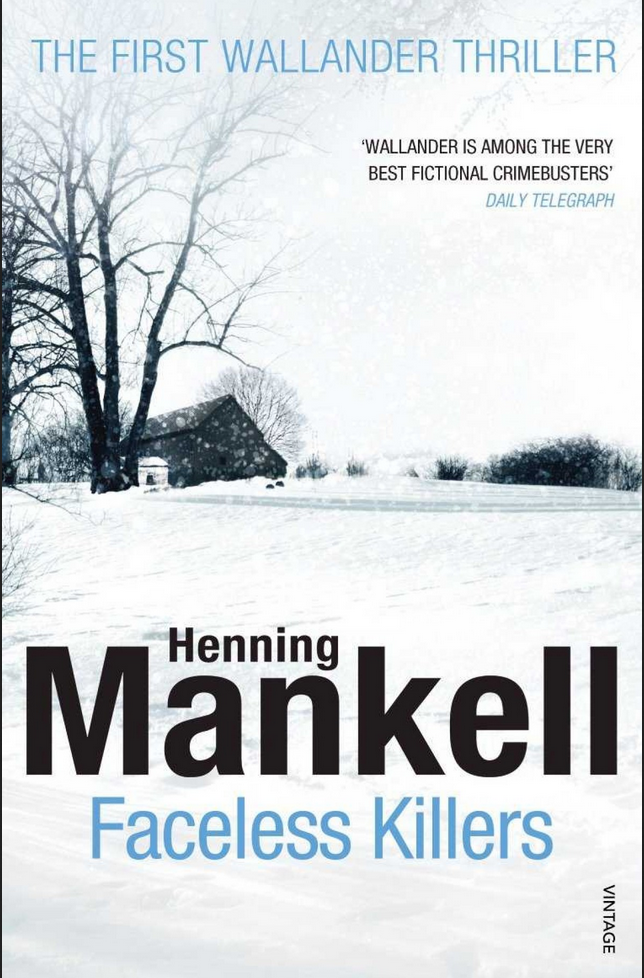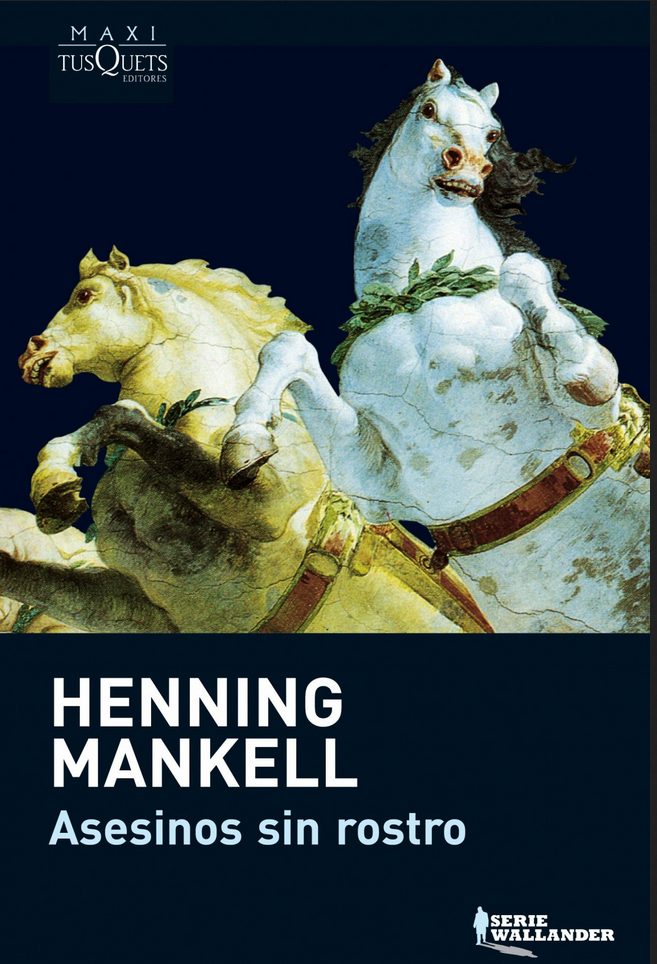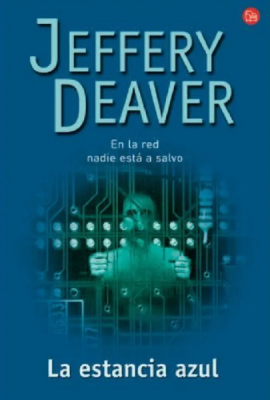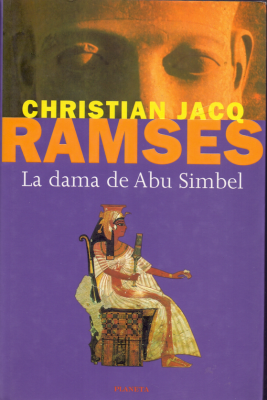
Faceless Killers is the first book dedicated by Henning Mankell to the series of his alter-ego, Commissioner Kurt Wallander, in the series acclaimed by the public and literary critics worldwide.
A very special character, far from the typical "American-style" policemen.
Wallander is overweight, close to retirement, with problems in his private life (separated from his wife, who in turn has problems with her new partner) and the normal problems of a teenage daughter, Linda.
But apart from these contradictions or problems that afflict most members of society, Wallander is a deeply human police inspector.
He detests the use of weapons and conducts interrogations trying to understand and not threaten the suspects, no matter how brutal the crimes may be.
Kurt is a policeman who is constantly struggling to understand the evolution - and the problems - of a Swedish society that has changed too much for his liking.
A society that is slowly beginning to instil a strong racist content in many of the actions of everyday life, violent or not.
Far away is that supposed European paradise that was able to get through the Second World War by maintaining a neutral attitude towards the conflict, with a tolerant and peaceful society, firmly and systematically opposed to any kind of violence.
Mankell's novels dedicated to Inspector Wallander are so real that, unlike other authors who create fictitious locations and places, Kurt Wallander lives in a real city, Ystad, in the south of Sweden, in the so-called Swedish Skåne, separated from Denmark by a few kilometres that can be crossed by sea. A beautiful place with more than 250 castles, Dutch mills and wild, immense and deserted beaches, forming a natural environment perhaps very different from that of the novels.
Wallander's house on Mariagatan Street is frequented by tourists trying to visit the place and the whole scenery where his novels are set is as real as this fact confirms: Henning Mankell regularly spent six months of the year at a farm he owned on the outskirts of Ystad (the one he would choose to retire to at the end of the cycle) and the other six months in Maputo (Mozambique, Africa - his adopted country if we must call it that) where he directed the Avenida theatre from 1987 until a few months before his death in 2015.

Asesinos sin rostro es el primer libro dedicado por Henning Mankell a la serie de su alter-ego, el comisario Kurt Wallander, en la serie aclamada por el público y la crítica literaria mundial.
Un personaje del todo particular lejos de los esquemas característicos de los policías "american satyle".
Wallander está excedido de peso, próximo a jubilarse, con problemas en su vida privada (separado de su mujer que a su vez tiene problemas con su nueva pareja) y los problemas normales de una hija adolescente, Linda.
Pero, aparte de estas contradicciones o problemas que aquejan a la mayor parte de los integrantes de la sociedad, Wallander es un inspector de policía profundamente humano.
Que detesta el uso de las armas y que conduce los interrogatorios tratando de entender y no amenazar a los sospechados, por más brutales que sean los crímenes.
Kurt es un policía que se debate permanentemente en la lucha interior por tratar de entender la evolución -y los problemas- de una sociedad sueca que ha cambiado demasiado para su gusto.
Que comienza a instilar de a poco un fuerte contenidon racista en muchas acciones de la vida cotidfiana, violentas o no.
Lejos está ese supuesto paraíso europeo que pudo atravesar la Segunda Guerra Mundial manteniendo una actitud neutral delante del conflicto, con una sociedad tolerante y pacífica, que se oponía en forma firme y sistemática a cualquier tipo de violencia.
Las novelas de Mankell dedicadas al comisario Wallander son tan reales que, a diferencia de otros autores que crean localidades y lugares ficticios, Kurt Wallander vive en una ciudad real Ystad, en el sur de Suecia, en la llamada Escania sueca, separada de Dinamarca por pocos kms atravesables via mar. Un hermoso lugar con más de 250 castillos, molinos holandeses y playas salvajes, inmensas y desiertas, conformando un ambiente natural tal vez muy distinto al de las novelas.
La casa de Wallander en la calle Mariagatan es frecuentada por turistas que tratan de visitar el lugar y toda la escenografía deonde son ambientadas sus novelas es tan real como lo confirma este dato: Henning Mankell pasaba regularmente seis meses del año en una granja de su propiedad en las afueras de Ystad (la que elegirá para retirarse al final del ciclo) y los otros seis meses en Maputo (Mozambique, Africa -su país adoptivo si debemos llamarlo de alguna manera-) donde dirigió el teatro Avenida desde el año 1987 hasta pocos meses antes de su muerte en el 2015.

In this first encounter with his readers (to be followed by several more books) Kurt Wallander must solve a murder case as bizarre as it is ruthless.
An elderly farmer's copy is brutally murdered and the last words the woman manages to utter when the police arrive - warned by a neighbouring farmer who hears the crazed neighing of the goats in the stable - are "foreigner", which causes all the social prejudices hidden in Swedish society up to that moment to emerge into the sunlight and find, as always, defenders and detractors.
With a father affected by a strong senility and a hostile character (he will never accept that his son has become a policeman instead of an artist following in his footsteps) who spends his days painting on canvas always the same motif, a grouse, changing only the background and his health problems aggravated by the cheap and ready-made food of every day, Wallander finds in his bachelor (or separated) flat listening to classical music the threads that will lead little by little to the resolution of the case.
In a society that can no longer hide its mistrust of the many immigrants who arrive daily, sometimes even clandestinely on Swedish shores via the Baltic countries, and which plans to organise its own security privately, Wallander has to disentangle himself in a labyrinth of repressed passions and hatreds from which he sometimes finds it difficult to detach himself.
But perhaps more than abstracting himself, he finds it difficult to understand the society of which he is inexorably a part.
Amidst the hatreds and passions, the investigation continues until it is discovered that the tortured and murdered farmer was in fact leading a double life linked to the organised sectors of the mafia, between prostitution, drugs and trafficking in stolen cars, using immigrants as intermediaries with the promise of a better life.

En este primer encuentro con sus lectores (al cuál luego seguirán varios libros más) Kurt Wallander debe resolver un caso de asesinato tan raro como despiadado.
Una copia de granjeros ancianos es brutalmente asesinada y las últimas palabras que logra pronunciar la mujer cuando llega la policía -advertida por un granjero vecino que escucha el relinchar enloquecido de los cabalos en el establo- es "extranjero", lo cuál da origen a que todos los prejuicios sociales escondidas en la sociedad sueca hasta ese momento, emerjan a la luz del sol y encuentren, como siempre ocurre, defensores y detractores.
Con un padre afectado por una fuerte senilidad y un carácter hostil (nunca aceptará que su hijo se haya transformado en policía en vez de artista siguiendo sus pasos) que pasa sus días pintando en la tela siempre el mismo motivo, un urogallo y cambiando solo el fondo y sus problemas de salud agravados por la comida barata y preconfeccionada de todos los días, Wallander encuentra en su departamento de soltero (o separado) escuchando música clásica los hilos que van conduciendo de a poco a la resolución del caso.
En una sociedad que no logra ya esconder su desconfianza por los numerosos inmigrantes que llegan a diario, a veces hasta clandestinamente sobre las costas suecas a través de los países bálticos, y que planea organizar su propia seguridad en forma privada, Wallander se tiene que districar en un laberinto de pasiones y odios reprimidos de los cuáles, a veces, le resulta difícil abstraerse.
Pero tal vez más que abstraerse le cuesta entender esa sociedad de la cuál inexorablemente- hace parte.
Ente odios y pasiones encendidas la investigación sigue adelante hasta descubir que el granjero torturado y asesinado en realidad conducía una doble vida vinculado a los sectores organizados de la mafia entre prostitución drogas y tráficos de autos robados usando como intermediarios inmigrantes con la promesa de una vida mejor.

It is clear that the emergence of Henning Mankell, writer, playwright, stage designer linked to the literary and artistic sector since he was a child, initially married (but later divorced) to the daughter of the enormous Ingmar Bergman, a film director of the kind you rarely see, marked a turning point in the literary scene not only in Sweden but also in Scandinavia.
His novels are a mixture of the classic American-style crime novel, in their focused and precise plot development, and a new Scandinavian noir characterised by the humanity of its central characters, in this case Inspector Kurt Wallander.
It is impossible not to identify with such a human character who, while following in the footsteps of a murderer, listens to Wagner at home, watches almost no television, sleeps very little, is not teetotal but does not overdo it with alcohol, has a teenage daughter with her normal domestic problems including an African boyfriend, uncertain about what career to pursue, an ex-wife from whom he has long since divorced but who continues to watch and listen to his lamentations about the new couple and only occasionally goes to the police station to practice with his orderly's pistol.
An absolutely atypical policeman, like his other colleagues at police headquarters.
It is clear that Mankell has tried to exaggerate the violence in the extreme south of Sweden, precisely Ystad, his hometown. The latest real statistics state that in this small town with no more than 30,000 inhabitants, a murder is committed every seven years.
But it also sounds like a warning, hence the beauty of this first book in the series.
A warning that no society, however solid, peaceful and neutral it may seem, is free from hatred and racism.

Es evidente que la irrupción de Henning Mankell, escritor, dramaturgo, escenógrafo vinculado al sector literario y artístico desde pequeño, casado inicialmente (aunque después divorciado) con la hija del enorme Ingmar Bergman, un director de cine de aquellos que se ven muy poco, marcó un antes y un después en el especto literario no suelo sueco sino escandinavo.
Sus novelas son una mezcla de la clásica novela negra de estilo americano, en su desarrollo argumental lentro y preciso- y de un nuevo noir escandinavo caracterizado por la humanidad de sus personajes centrales, en este caso el comisario Kurt Wallander.
Es imposible no identificarse con un personaje tan humano que mientras sigue los pasos de un asesino escucha Wagner en su casa, no mira casi televisión, duerme muy poco, no es abstemio pero tampoco exagera en demasía con el alcohol, tiene una hija adolescente con sus normales problemas domésticos entre los que se incluye un novio africano, incierta sobre que carrera seguir, una ex-mujer de la que se ha divorciado hace tiempo pero que continúa a ver y a escuchar sus lamentaciones sobre la nueva pareja y solo de vez en cuando va al polígono policial a practicar con su pistola de ordenanza.
Un policía absolutamente atípico, como sus demás colegas de la central de policía.
Es evidente que Mankell ha tratado ex-profeso de exagerar con la violencia en el extremo sur de Suecia, precisamente Ystad, su ciudad. Los últimos datos estadísticos reales afirman que en esa pequeña ciudad que no supera los 30.000 habitantes se comete una sesinato cada 7 años.
Pero lo suyo suena también a advertimiento y de ahí la belleza de este libro inicial de la serie.
Advertencia sobre el hecho que ninguna sociedad, por más sólida, pacífica y neutral que parezca, está exenta del odio y del racismo.
The text separator - modified by the author with his custom logos - is the property of The Peak Studio and has been published under the Free to use licence.
El separador de texto -modificado por el autor con sus logos personalizados- es propiedad de The Peak Studio y ha sido publicado con la licencia Free to use.

Latest book reviews published in this Community. / Ultimas reseñas de libros publicadas en esta Comunidad.



Uno de mis autores de policiales preferido!
Sin lugar a dudas es uno de mis preferidos también. Tengo todos sus libros (en italiano) recuerdos de mis muchos años vividos en aquél país.
Saludos @hosgug y gracias por comentar.
very interesting premise.
I looked it up on GoodReads and the book was published way ahead of its time in 2003. I believe if it was published today it would face a lot more scrutiny. Now that I have gotten the gist of the book, do you still recommend I read it?
Congratulations @greengalletti! You have completed the following achievement on the Hive blockchain and have been rewarded with new badge(s):
You can view your badges on your board and compare yourself to others in the Ranking
If you no longer want to receive notifications, reply to this comment with the word
STOPCheck out the last post from @hivebuzz:
Support the HiveBuzz project. Vote for our proposal!